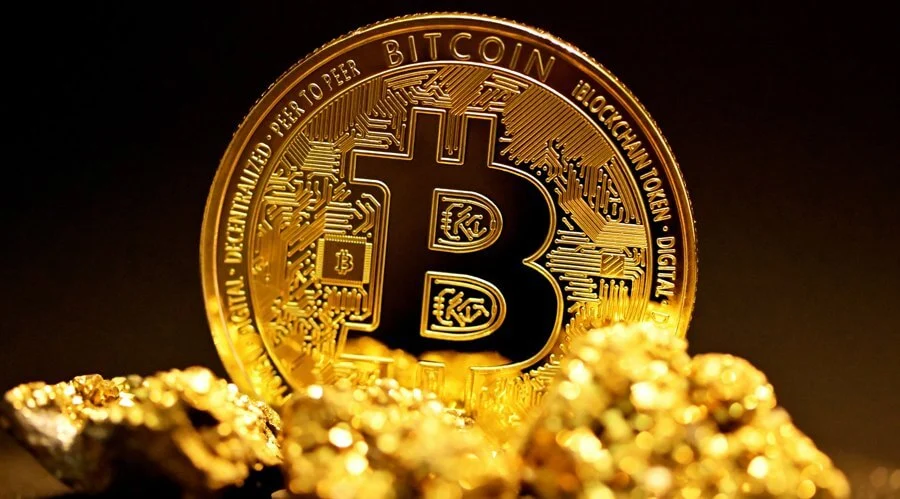In the ever-evolving landscape of finance and digital assets, Bitcoin has consistently garnered attention not only for its technological innovations but also for its evolving narrative within the global financial ecosystem. Recently, Larry Fink, the CEO of BlackRock, one of the world’s largest asset management firms, made headlines by revising his stance on Bitcoin. Fink, who had previously expressed skepticism about Bitcoin, now describes it as “digital gold” and acknowledges his past misjudgment of the cryptocurrency’s potential.
The Journey of Bitcoin: From Disruption to Mainstream Acceptance
Bitcoin, introduced in a whitepaper by pseudonymous creator Satoshi Nakamoto in 2008, was envisioned as a decentralized digital currency free from the control of central banks and governments. Its underlying technology, blockchain, promised secure and transparent transactions without intermediaries. In its early years, Bitcoin faced skepticism and scrutiny from traditional financial institutions and regulators wary of its disruptive potential and association with illicit activities.
However, over time, Bitcoin has transcended its early challenges to emerge as a legitimate asset class and a store of value. The concept of Bitcoin as “digital gold” gained traction as investors sought alternatives to traditional fiat currencies susceptible to inflation and geopolitical uncertainties. Bitcoin’s finite supply (capped at 21 million coins), decentralized nature, and growing adoption as a means of payment and investment have bolstered its reputation as a hedge against economic instability and a store of long-term value.
Larry Fink’s Shift: From Skepticism to Recognition
Larry Fink, known for his influence in the global financial markets, initially expressed skepticism about Bitcoin. His previous comments often highlighted concerns about regulatory scrutiny, volatility, and the lack of intrinsic value backing the cryptocurrency. However, Fink’s recent statements indicate a significant shift in perspective.
In a notable turnaround, Fink now acknowledges Bitcoin as “digital gold,” a label that underscores its role as a store of value akin to the precious metal traditionally valued for its scarcity and resistance to inflation. This recognition marks a pivotal moment in the mainstream acceptance of Bitcoin within institutional circles, where BlackRock’s influence could potentially shape broader perceptions and investment strategies.
The Case for Bitcoin as Digital Gold
1. Scarcity and Store of Value
One of the fundamental arguments supporting Bitcoin’s comparison to gold is its scarcity. Unlike fiat currencies that can be printed at will by central banks, Bitcoin’s supply is algorithmically capped at 21 million coins. This scarcity is designed to mimic the properties of precious metals like gold, which historically have served as stores of value and hedges against inflation.
2. Decentralization and Security
Bitcoin operates on a decentralized network powered by blockchain technology, which ensures transparency, security, and immutability of transactions. The absence of a central authority mitigates concerns about manipulation and censorship, enhancing Bitcoin’s appeal as a resilient and trustworthy asset in a digital age increasingly shaped by data privacy and cybersecurity concerns.
3. Institutional Adoption and Investment Demand
In recent years, Bitcoin has gained traction among institutional investors seeking diversified portfolios and alternative investments. High-profile endorsements from companies like Tesla and Square, as well as institutional investors such as hedge funds and asset managers, have contributed to Bitcoin’s mainstream recognition. Institutional adoption has also been bolstered by the growing infrastructure supporting Bitcoin transactions, custody solutions, and regulatory clarity in some jurisdictions.
4. Global Macro Trends and Economic Uncertainty
The economic turbulence witnessed globally, exacerbated by factors such as the COVID-19 pandemic, geopolitical tensions, and monetary policy responses, has heightened interest in non-traditional assets like Bitcoin. As central banks implement unprecedented monetary stimulus measures, concerns about inflation and currency devaluation have driven demand for assets perceived as stores of value, including Bitcoin and gold.
The Evolution of Institutional Sentiment
Larry Fink’s revised stance on Bitcoin reflects broader shifts in institutional sentiment towards digital assets. Initially dismissed as speculative and volatile, Bitcoin has gradually gained recognition as an asset class worthy of consideration within diversified investment portfolios. The maturation of cryptocurrency markets, improved regulatory frameworks, and advancements in technology have contributed to this evolving acceptance among institutional investors traditionally cautious of emerging asset classes.
Challenges and Considerations
1. Regulatory Landscape
Despite growing acceptance, regulatory uncertainty remains a key consideration for institutional investors and market participants. Regulatory frameworks governing cryptocurrencies vary widely across jurisdictions, impacting market liquidity, investor confidence, and operational compliance for institutional adoption.
2. Volatility and Risk Management
Bitcoin’s price volatility, characterized by sharp fluctuations in short periods, poses challenges for risk management and portfolio diversification strategies. Institutional investors often implement rigorous risk assessment and mitigation measures to navigate market dynamics and protect capital against unforeseen market movements.
3. Technological Innovation and Infrastructure
Advancements in blockchain technology and cryptocurrency infrastructure are pivotal in supporting institutional adoption and enhancing market liquidity. Continued innovation in areas such as scalability, interoperability, and security solutions is essential for strengthening Bitcoin’s role as a viable asset class within global financial markets.
Future Outlook: Bitcoin and Beyond
As Bitcoin continues to evolve from a niche digital currency to a mainstream asset class, its role in global finance and investment portfolios is likely to expand. The convergence of technological innovation, regulatory clarity, and institutional adoption will shape the future trajectory of Bitcoin and its broader impact on financial markets.
Larry Fink’s acknowledgment of Bitcoin as “digital gold” signifies a significant milestone in the cryptocurrency’s journey towards mainstream acceptance. While challenges and uncertainties persist, Bitcoin’s resilience, scarcity, and growing institutional interest underscore its potential to redefine traditional notions of value and investment in the digital age.
In conclusion, Bitcoin’s evolution as “digital gold” reflects a transformative shift in global finance, where digital assets challenge conventional paradigms and offer new avenues for diversification, wealth preservation, and financial inclusion. As institutional adoption continues to accelerate, Bitcoin’s role as a store of value and a hedge against economic uncertainty is poised to shape the future landscape of finance in profound and unexpected ways.



